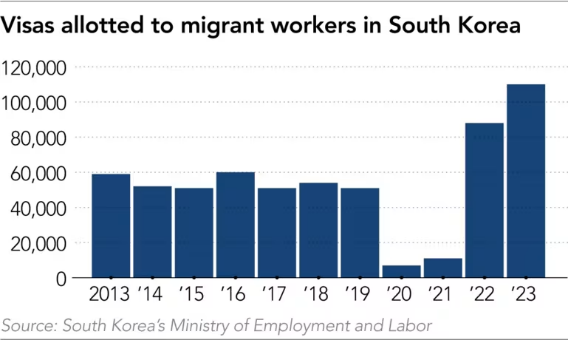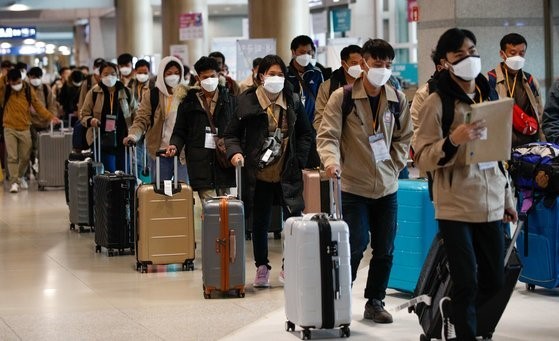The fertility rate continues to be low, causing labor shortage. The South Korean government relaxes the rules for migrant workers.
South Korea relies on foreign labor to fuel economic growth, and as the birth rate falls, the state expands the range of jobs held by foreign workers。
South Korea's immigration laws are very strict, and since the 1990s, the country has been dealing with labor shortages in areas with long hours and low wages, especially in agriculture and manufacturing, through the entry of temporary foreign workers.。But now, the South Korean government is gradually making foreign workers an important part of the country's economic future.。
The government led by South Korean President Yoon Suk Yeol is working to significantly increase the number of migrant workers and expand the range of jobs they can take in order to address the current severe labor shortage and promote economic growth.。In a public speech in July this year, Minister of Justice Han Dong-hoon said frankly: "Without immigration, South Korea has no future."。"
According to statistics, the number of visas issued to foreign workers in South Korea has been raised to 110,000 this year, with a total of 8 last year..80,000, also a record high, up from 5.A significant increase of 10,000。
Like rapidly aging Japan, South Korea has one of the world's lowest birth rates and is increasingly dependent on foreign workers.。At the same time, policymakers are looking for ways to solve their country's workforce problems, hoping to increase their enthusiasm for work。However, while Japan has been attracting skilled workers to industries such as machine parts and tool manufacturing with great fanfare, the vast majority of Korean workers are engaged in unskilled or semi-skilled jobs in factories, farms and fisheries.。
The good news, however, is that this situation may be about to take a turn for the better.。Business owners have called on the government to adjust the law to make it easier for foreign citizens to enter industries that are difficult to recruit, such as catering, accommodation and courier services.。

Recently, a right-wing editorial in South Korea stated that the government should "boldly relax restrictions on manpower-deficient industries in accordance with the needs of various industries."。
At the same time, a Seoul government initiative has raised concerns about plans to encourage the introduction of domestic workers from elsewhere in Asia who will be paid less than locals.。
In advanced Asian economies such as Hong Kong and Singapore, domestic workers from poorer countries have long worked as maids and childcare workers, but South Korea has so far failed to follow suit, leading small families to rely on either relatives or expensive private care.。
Seoul Mayor Oh Se-hoon said the introduction of foreign domestic workers would help ease the decline in the country's birth rate。"Although their monthly salary is between 2 million and 3 million won (about US $1,500 to US $2,200), it is only a fraction of the monthly salary in Hong Kong and Singapore.。"He said。
Surprisingly, the mayor's remarks were criticized by overseas domestic workers, so the South Korean government stipulated that workers in this type of work will receive at least the minimum hourly wage (currently 9,620 won), but still below the "market price (15,000 won)."。
It is reported that the South Korean government is moving forward with a pilot program that will bring in about 100 domestic workers.。But experts suggest the government must tread carefully as it expands its openness to immigrants。
In response, Oh Kye-taik, director of the Center for Wage and Work Innovation at the Korea Institute of Labor, said, "Korean workers are reluctant to choose certain jobs that pay too little or too hard, and in these areas, the use of foreign workers is a reasonable choice.。"But some companies want to hire foreign employees because of lower wages for the same job, which can cause problems."。"
Not only that, but there are questions about South Korea's tolerance of migrant workers, as earlier, poor working conditions and abuse of workers made occasional headlines.。
Therefore, the Korean Federation of Trade Unions has proposed that the lives and safety of workers at work must be strictly protected, and the Korean government should raise workplace standards and change Korea's perception of the role of foreign workers.。
Advocates also argue that as more immigrants enter South Korea, aid center budgets should be maintained or increased, not cut.。In response, the Ministry of Employment and Labor said: "The reality is that the relevant budgets have been adjusted to allow government and public agencies to provide consulting and educational services directly, which were previously only provided through private aid agencies (including non-profit organizations).。
The number of migrant workers in Korea is still increasing, but it remains to be seen if the country can establish a complete job market for foreign workers。

·Original
Disclaimer: The views in this article are from the original Creator and do not represent the views or position of Hawk Insight. The content of the article is for reference, communication and learning only, and does not constitute investment advice. If it involves copyright issues, please contact us for deletion.